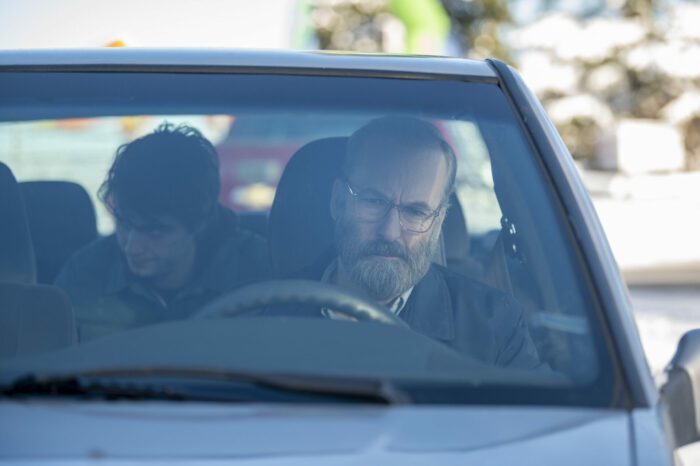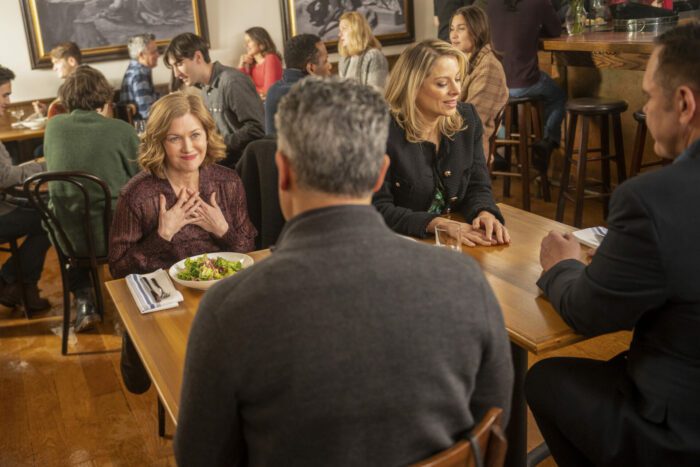The following recap contains spoilers for Lucky Hank S1E7, “The Count of Monte Cristo” (written by Taylor Brogan and directed by Nicole Holofcener)
As any 12th-grade English student can tell you, The Count of Monte Cristo centers around many themes including revenge, justice, redemption, and fulfillment. In Lucky Hank’s seventh episode, also titled “The Count of Monte Cristo,” our lead character Hank and everyone else in close orbit to him run through the gambit of each one of these themes as they attempt to find their own version of what it means to be fulfilled and happy.
As the penultimate episode opens, Lily is off to New York to find a potential new apartment after accepting her job offer, and Hank warns her, “You’re too happy!” It proves to be an ominous starting line for this sprint of an episode that tries to accomplish a lot before the finale next week. All of the core family of Hank (Bob Odenkirk), Lily (Mireille Enos), and Julie (Olivia Scott Welch) cover an incredible amount of literal and metaphorical ground in this one, with one central question surrounding each of them: Can any of the three actually transform into the version of themselves that will finally find happiness?

With Hank alone in the house for a few days, he spends Episode 7 see-sawing between seeking the fatherly companionship he never had and trying to be the man his father never was. Lily is gone which forces Hank to try and survive on a constant diet of pickles, blocks of cheese, and reality TV. Lily, it turns out, has served as his proxy mother for years, and without any “adult” supervision, Hank is actually capable of devolving further into a full-blown slob. He doesn’t change out of pajamas. He discovers a leak under the kitchen sink and ignores it. He is a child again.
It takes Julie coming over and frantically asking if he has seen her missing husband, Russell, and his old buddy Tony dropping by to return a chainsaw, before Hank is actually motivated to get out of his house. With his father’s memory gone, Hank is now divorced from reality, Julie is concerned she is on the verge of divorce, and Tony gives Hank the advice only a former divorcee can impart: “climbing out isn’t easy. Start with just one thing and get it done.”
Hank considers himself like the titular character in The Count of Monte Cristo, except instead “of plotting revenge for 40 years, I have been plotting a pointed conversation with my dad, and now the man I have wanted to confront is gone. Gone.” But even just the admission is going to propel him into a mini hero’s journey through this episode that has him starting out helpless but ending it hopeful.
The first test of the journey is when Hank sees his dad walking alone while he drives to the hardware store for plumbing parts. Even the simple decision to stop and pick up his dad allows Hank to walk up the first step of being the support to his father that Hank never got when he was young. You can’t climb Mount Everest without taking the first step up the mountain.
Hank takes his father to his office, allowing him to have meaningful, spirited conversations with fellow English colleagues. He lets his father shop for a car, even after understanding that he is too broke and senile to be able to drive one. Hanks takes his father with him to the hardware store, even though he thinks it is the Colombia University library. Hank finally brings up the conversation he has plotted for 40 years only to hear his father admit—in a striking moment of clarity—that he was never going to be a father. William Devereaux had other professional pursuits and he admits to Hank that “you can’t be in-between in life. You’ve got to put yourself all-in and make that choice.”
Despite how damaging these words are to Hank and despite the fact that William states his regrets are that he has been too harsh on Charles Dickens throughout his literary criticism career, Hank decides to use his father’s words as a type of rallying cry to finally be the kind of father that his dad never could be.

With Lily still out of town, that means he turns to Julie and her strained relationship with Russell. It turns out, in fact, that Russell wasn’t just missing. He was cheating on Julie and had been too afraid to come home. Earlier in the episode, Hank tries to console his daughter with distinctly Hank-ish platitudes like “Have you ever heard of Occam’s razor?” and “You want me to call him?” and “He doesn’t feel respected around you,” before wondering out loud why Julie still pays for an Amazon Prime membership. He is there but not there. He is the opposite of what Julie needs when her mom is out of reach. He is just like his dad used to be.
After the long-awaited confrontation with his father, Hank wants another chance with Julie. He drives straight back to her house, only to be greeted with a well-deserved “I don’t need any more of your help” from Julie. But Hank isn’t there to help this time. He is there to make tea. He is there to be quiet and listen. He is there for Julie to put her head on his shoulder. Hank took his dad’s advice and, in this moment, decided to not be in-between with his daughter. He decides to go all-in. Her mom is out of town and her philandering husband is MIA. It’s the ideal opportunity for Hank to be a father. Maybe to even be the father he has never been before.
In the Season 1 finale, Hank is going to have several more conflicts that are going to obfuscate his ability to go all-in on certain important things. The story of Hank’s life (or at least what little we have seen on-screen) is that happiness for him is fleeting. The little we see of Lily’s house-hunting in New York foretells a storm that’s coming. As Lily struggles to find the right place, her realtor asks her to describe her perfect day to help put her in the space of what type of home she should have. The realtor is surprised to hear that Lily’s perfect day does not consist of any time with her husband, her daughter, or the life they have built in Pennsylvania.

And in one of the wildest scenes of television I have ever seen, Lily gets seated with a man at a restaurant who is trying to help the woman he is there with not get caught cheating. Lily and this stranger strike up a superficial conversation, which quickly transitions into an opportunity for Lily to have a practice run of the speech she is mentally preparing to give to Hank. She wants a divorce. She sees very little growth in him and he is doing nothing but holding her back from achieving the things she wants to do with her life. Some kind of showdown is coming between the two, and it’s sure to be just as uncomfortable as the dinner party in Episode 5.
Back at Railton College, the faculty strike has not worked and so President Dickie Pope’s plan of cutting faculty is imminent. Hank continues to not want to get involved in the minutiae of how he can possibly save some of their jobs, so he chooses to ignore it throughout this episode.
The finale next week is titled “The Chopping Block,” which surely has layers upon layers of meaning when we get to it. Can the marriage between Hank and Lily survive the chopping block? Which faculty survive it? If Hank and Lily split, which side does Julie choose, knowing she has a much closer relationship with her mom but her dad was finally able to be there when she needed someone most. Is any kind of relationship with his father and mother able to survive the chopping block?
But most importantly, is the type of man that Hank dedicated himself to be by the end of this episode something that is sustainable. Just like the Count of Monte Cristo, is Hank willing to finally move on from feelings of revenge, justice, and retribution and instead do the “all-in” things that give him happiness and fulfillment?
Hank may have admitted in this episode that he thought Alexandre Dumas was a dumb-ass, but the author literally wrote the book on how to navigate through feelings of revenge and fulfillment. Which road Hank chooses to travel should set up what is sure to be a dramatic and emotional finale.

